- Home
- Joseph Bruchac
Sacajawea Page 2
Sacajawea Read online
Page 2
The best of the letter was at the end. Though this would be an enterprise with its share of fatigue, dangers, and honors, if there was anything that might induce me to participate, he said, "There is no man on earth with whom I should feel equal pleasure in sharing them as with yourself."
Not only that, we would share the command. Two captains together, striking out across the continent. I lost no time in writing back to my dear old companion.
"My friend," I told him, "I join you with hand and heart."
3. SACAJAWEA
Among the Minnetarees
Now that the snow has begun to fall in the mountains, Coyote will not be displeased if we talk about him. Yes, this is a story about Coyote.
Coyote was always changing things. He was not like Older Brother Wolf who liked things to stay just as they were. No, even when things were good, Coyote had to change them. And he was so curious. Whenever he saw something new, Coyote had to go and see what it was.
That is how Coyote is.
IS THERE SPACE inside your head for more words?...Ah, that is true. A story is different. There is always a place for another story. Do you remember where I tied the knot in my story?...That is right, it was just when a Minnetaree had taken me captive.
Otter Woman had been taken captive, too. She and I spoke softly to each other to keep our spirits up as we traveled down the river trail. Our wrists were tied to ropes that were held in the hands of the cruel Minnetarees who had caught us. That way, even though we were riding horses, we could not try to escape. Still, we made halfhearted jokes about how ugly our captors were.
"This one who has grabbed me is so ugly," I said, "that the only way he can get close to a woman is by tying her to a rope!"
"Hah," Otter Woman whispered. "You are lucky. This one is so ugly that even a grizzly bear would run from him in fright."
I almost smiled, despite the rawhide that was tight around my wrists. But I could not leave it at that. I could never let Otter Woman get the better of me, even when we were making jokes that might get us beaten by our captors.
"Mine is worse than that," I said. "If he should see his own reflection in the river, it would frighten him to death."
From behind me I heard an even deeper laugh than Otter Woman's. It was the Minnetaree who held her rope. His ears were better than I had expected, and it seemed he knew more of our language than we thought.
"Horned Weasel, it is true what this one says about you being hard to look at," he called up to my captor, speaking in our language. "I have seen how you always look away when you are close to the water."
"Be quiet," said Horned Weasel, the one whose hand held the rope about my wrist. He jerked the rope just hard enough to almost pull me off onto the ground, where the horses might have stepped on me.
***
I imagined my brother and others in my tribe ambushing the Minnetarees and setting us free. I waited and waited, silendy, but this did not happen. Deer do not attack a mountain lion, even though they outnumber it.
I knew that some of our people had been hurt and killed when the attack came on our camp. It would be hard enough for them to survive now that most of their horses had been taken, horses that Otter Woman and the other captives and I were now being forced to ride. We would be mourned. We would not be forgotten. Yet there would be no attempt at rescue or revenge.
Horned Weasel, the leader of the raiding party, took us along the river, across hills I had never seen before, and down into a camp far from my own land. And there I settled into the life of a captive.
I was shocked by the Minnetaree people. They were ill-mannered. Perhaps it was because they had been influenced by the white traders—those who have upside-down faces.
Did I ever share with you our tale of why the white people were sometimes spoken of in that way, my son? It is said that the first white man one of our Indian people saw had hair all over his chin and no hair at all on the top of his head.
"Ah," said the one who saw that man, "the Creator must have been confused when these people were made. They were given faces that are upside-down."
Those Minnetarees had learned many things from the upside-down-faced people. There was the food they ate. Not just good buffalo meat or deer meat or corn, but strange food. Some of that food was so sweet, sweeter than berries, that it made me long to be able to share it with the brother and the friends that I would probably never see again. Some of it tasted dry, caught in the throat, and hurt the tongue.
Then there was the way they dressed, with big cloth hats and shirts, mirrors and bright beads and other things bought from the traders. And the way they talked. Not just their own strange language, but mixing in new words I had never heard before, words I later learned were French and English. Most of them were words that men say to each other only when they want to insult someone or show how much they despise that person. All those things were so strange. It could not have been stranger to me if I had been taken captive by a band of bears dressed like people.
So we traveled down the river toward the trading towns of the Mandans and the Minnetarees. I was hoping for rescue, but as I traveled I kept my eyes open. I was learning about the world beyond our mountains. Little did I know then how far I would travel and how much of that new world I would see.
***
What was it like to be a captive? I can tell you this, I was soon sorry that I had asked the river what it was like to travel. Remember, Firstborn Son, never ask a river for anything unless you are sure it is something that you truly desire. For when I was given what I asked for, it was not something that I wanted at all.
First of all, traveling as one held captive is not something to enjoy. It means having your hands and legs bound. Your wrists are chafed and begin to bleed. Your back and your neck become stiff, and even when you are allowed to dismount and rest, you cannot really rest. At any moment those who control you may decide it is time again to travel. And you have no choice. To be a captive means that even when those bonds are removed, you are still not truly free. For you still have your every movement watched. Those who hold you against your will know that, at first, your only waking thought is to escape. To return to your parents, to walk again in those familiar places where you picked berries or knelt by the fire and cooked with your mother. The places where you gathered camas roots, the places where you listened to the songs of the mountains. The places where you sat by the river and dreamed. Someday, Firstborn Son, I will take you to those places. I will show you the three rivers that come together. I may even take you farther and show you the river that the captains named for me, even though it already had a name.
Yes, our captains loved to name things that were already named. So it was that I became no longer Bird Woman but Janey. But that was later, and we must walk much further in my story before we reach that place.
After traveling many days, we reached the villages of the Mandans and Minnetarees. There I saw others who were captives. I heard many languages spoken and saw things I had not seen before. But I was given little time to just stand and watch. I was quickly put to work. Horned Weasel gave me to his aunt, Red Calf Woman, who lived in his lodge. She was not unkind to me, but it did not seem that she loved me. So, even though Red Calf Woman asked me to do only a little more work than my own mother had asked, that work seemed very hard. It was the sort of work I would have done gladly as a young girl among my own people. But for the Minnetarees, it was not work I could choose to do or not. It was work I was forced to do or I would be beaten. Tanning skins, carrying water, bringing firewood, such things became my daily routine. I worked tirelessly, from dawn to dusk.
Otter Woman was also given to Red Calf Woman. That was the only good thing about our captivity. We were together. Sometimes, as we worked together, we laughed and joked. But we were more careful with our joking now. Red Calf Woman did not mind. She herself was always making teasing remarks about the men. They could not respond to her quick tongue. But if Horned Weasel or any of the others disapproved of
what Otter Woman or I said, they could push us down or cuff us with an open hand.
At night Otter Woman and I slept near each other. Then we could whisper stories to each other in our own language. During the days we were forced to speak in their language. Later I would be glad that I could speak it so well. But then it stuck in my throat like a bone in a chewed piece of meat.
Some women who are captives seem to be quick to forget who they were. They marry into their new tribe, bear children, think of themselves as no longer Shoshone, but now Minnetaree or Mandan or Lakota. I vowed to myself that I would not be one of them. No matter how far I traveled, no matter who became my husband, I would never forget my own name. I would never forget the place where I was born and that my mother had planted a small fir tree over my birth cord. Like the roots of that tree, I was bound to that land. I would never forget the names of my people. Somehow, I whispered in the night, I would always return to them. And when I was alone by the river, I made my promise to its waters as well.
"River," I would say, "there will come a dawn when you carry me home."
How did I meet your father? Your father was not a young man even then. Even though he was self-important, it was said among all the tribes that knew him that Toussaint Charbonneau was a man of little courage. Whenever he met danger, he was not slow to run and go in the opposite direction.
"How else," he would say, "can a man expect to grow old, unless he runs away from whatever would kill him?" Do not worry, my son, your father will live to be an old, old man.
So it was that people gave him such names as the Bear of the Forest. That was how the Mandans called him. To the Minnetarees, he was Chief of the Smallest Village. The Arikaras called him Great Horse from Afar. Those were names not to honor him but to poke fun.
But he was also known to be clever. That is why he has always had success as a trader. He knows just what to ask for his goods, how to bargain, what to say at the right time. Perhaps your father's ways have been chosen by him to put our people at ease. A man who makes people laugh is always welcome.
And that is how it was that day. He saw Otter Woman and me and he immediately started making funny faces at us. Soon we both were laughing. He knew we were captives, but he did not ignore us or treat us badly. Though he spoke Hidatsa poorly, he was able to make himself understood through signs and the bit of French that the Minnetarees could speak. He said he would like to buy us. Horned Weasel offered to gamble for us, instead. He liked playing the game of hiding the stick inside the moccasin and was sure Charbonneau could not beat him.
Red Calf Woman did not like the idea. She did not want to chance losing the two strong young women who were now doing most of her work for her. When the soil had to be worked in Red Calf Woman's field with the hoes made of buffalo shoulder blades, it was Otter Woman and I who spent longer than any of the other girls in the field. When it came time to use the rakes made of sticks tied to a pole, we were the ones who could always be found scratching weedy soil about the short stalks of corn. But Horned Weasel reminded her that he was the one who had brought us to her.
"These two girls eat too much," Horned Weasel told Red Calf Woman. "If I lose them it will not hurt us."
So they began to play. Your father put a stack of trading goods up. If he lost, Horned Weasel would win that pile of cloth and gunpowder and musket balls. As Otter Woman and I watched, we could see how clever Charbonneau was. He talked and gestured all the while he played; he sang, tapped the ground, moved his feet back and forth as he moved the moccasins about, finally hiding the stick in one of them—or keeping it concealed in his hand. It was funny to watch his antics. Even Horned Weasel found it hard to keep from laughing, although each time he reached out his own stick to tap a moccasin or a closed hand, Charbonneau's stick was not there.
When it was over, Charbonneau had won us both. I was glad we were together, for I did not want to be parted from Otter Woman. We were so close. We had promised each other always to be sisters. We had promised that when we had children, each of us would treat the others sons and daughters as her own. If we had been separated then, I am not sure that I could have continued to live.
Now we would both be wives to this funny old man with hair on his face like a bear of the forest.
"This will not be a bad thing," I whispered to Otter Woman. "If we are to live with a trader, we will not have to spend all of our days working in the fields in the growing season or chewing deerskin to make it soft in the winters. No one could ever make us work harder than Red Calf Woman did. And now, at least, our lives will be more interesting."
I did not realize, my son, just how true were those words of mine!
But that is enough for now. I will tell you more on another day.
4. WILLIAM CLARK
York
Sunday May 20th 1804
This morning was fair, and the weather pleasant; at 10 Ock. A.M. agreably to an appointment of the preceeding day, I was joined by Capt. Stoddard, Lieuts. Milford & Worrell together with Messrs. A Chouteau, C. Gratiot, and many other rispectable inhabitants of St. Louis, who had engaged to accompany me to the Village of St. Charles; accordingly at 12 Ock., after bidding an affectionate farewell to my Hostis, that excellent woman the spouse of Mr. Peter Chouteau, and some of my fair friends in St. Louis, we set forward to that village in order to join my fellow companion and fellow labourex Capt. William Clark, who had previously arrived at that place with the party destined for the discovery of the interior of the continent of North America...
JOURNAL OF MERIWETHER LEWIS
EVE OF DEPARTURE UP THE MISSOURI
ST. CHARLES. LOUISIANA TERRITORY
I HAVE KNOWN YORK longer than anyone. What is troubling York? Why does he seem so unhappy? Even I cannot always tell. We have been constant companions since long before he accompanied our Corps of Discovery as my personal servant—he ended up doing as much as any man among us. York's own father was my father's lifelong servant. I remember so clearly the days when both of us were smaller than you are, Pomp. We stole apples from the orchard together, shared them, and then shared the licking when we got caught, too. It is difficult to imagine a man who has been closer to me in many ways. Nor can I imagine what our great adventure would have been like without him along.
But you see, boy, York is a slave. Fine a man as he is, he will never have the same chance as a white man. It is not that he is any less strong or brave or even smart. When we had to decide our course of action that hard winter on the Pacific Coast, and we called for a vote among all present on our journey, York's vote counted as much as that of any other man—or woman, for your mother's vote was tallied right along with that of everyone else in our company.
And you should have seen him that first day as we traveled up the Mississippi and when we reached its big boiling waters. We calculated she was two hundred yards wider than the big Ohio before the two rivers joined up, and then more than a mile wide after the joining. York bent his back into the oars of the pirogue better than any other man. That is how he always was, taking on as much work as any man in our company and doing it with glad heart. I shall never forget the way he would laugh, even when we were in the worst of danger. His was a laugh big enough to shake the sky.
If he was to have gone off on his own, if I was to have freed him like some have done with slaves they have loved, why, it would have been no favor to York. Not at all. President Jefferson understood that. I never saw a man who cared for his slaves more than Tom Jefferson, but he knew, as any good Virginian knows, what freedom can do to a man or a woman who has not been raised to really understand it.
If I had been fool enough to give York his freedom, then it would have ended up hurting my old friend. He would have been confused, lost his way. He would not have known how to care for himself. He would have just fallen in with bad company. Or, worse yet, some of those damn slave catchers might have seen a strong, healthy man and figured they would get some quick money. They would have clapped him in irons, thrown away hi
s free papers, and sold him downriver in New Orleans. I saved York from a freedom he could not handle. Be assured, boy, I love old York as much as you do. I will take care of our old friend and be sure he does not come to any harm.
How else did he aid us on our expedition? For one, York was a marvel to the Indians. Once we began to make contact with them, he became one of their main topics of conversation. Hardly a day went by without some Sioux or Mandan or Shoshone or Nez Percé or Clatsop coming up and rubbing York's skin to see if the color would come off. There was a game we would play whenever we came to a new village. We would pretend he was some sort of wild beast. York would run about roaring and grabbing at people as if he were mad. That would impress them something fierce. But eventually he would be taking part in games of skill with the men—and usually winning—or playing with their children, or being admired by their women. Yes, indeed.
Despite York's help, we knew right from the start that we would need another person to aid us. When we went up the Missouri River, we would enter lands where no white man had been before. There we would need a special sort of person. We needed someone who knew the land and the people, someone who could help us get horses when we left our boats behind.
Our time here in St. Louis was spent making ready. There were months of provisions to buy, trade goods to be chosen and bundled, guns and powder balls and charges to be readied, men to be hired. We were anxious to be on our way, to get as far upriver as we could before we had to stop and camp for the winter. Yet nothing could be forgotten, nothing we needed left behind. I packed and unpacked and repacked the boats at Wood's River, trying every possibility while our men grew more and more restless. Back in St. Louis, Captain Lewis negotiated for the last of our provisions. At last, near the end of May, we were ready, and we set out up the river.

 Peacemaker
Peacemaker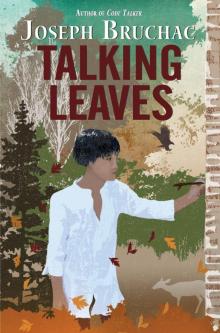 Talking Leaves
Talking Leaves Found
Found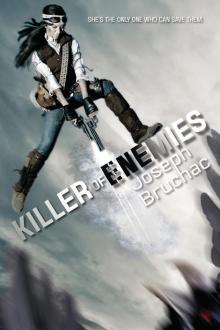 Killer of Enemies
Killer of Enemies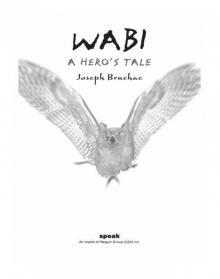 Wabi
Wabi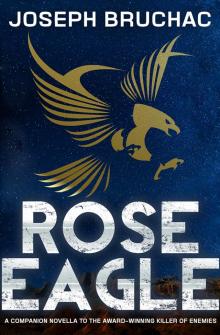 Rose Eagle
Rose Eagle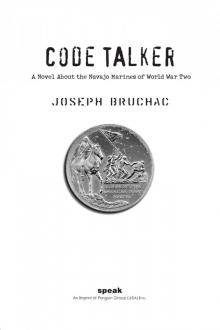 Code Talker
Code Talker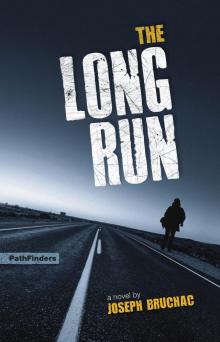 The Long Run
The Long Run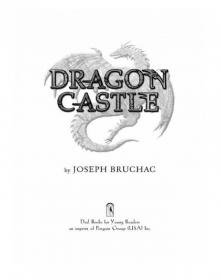 Dragon Castle
Dragon Castle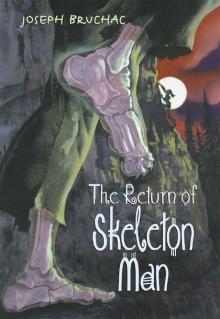 The Return of Skeleton Man
The Return of Skeleton Man Pocahontas
Pocahontas Whisper in the Dark
Whisper in the Dark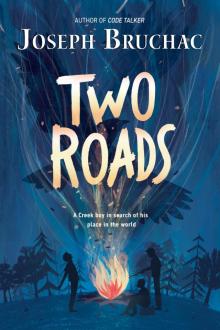 Two Roads
Two Roads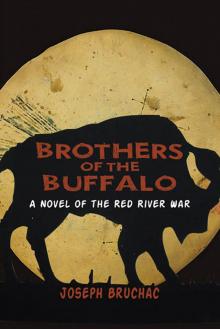 Brothers of the Buffalo
Brothers of the Buffalo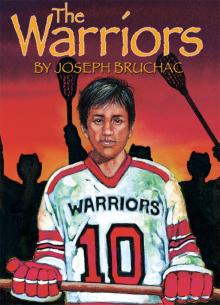 The Warriors
The Warriors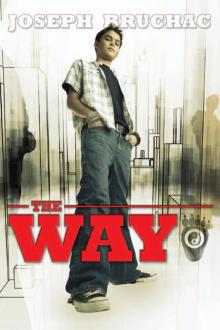 The Way
The Way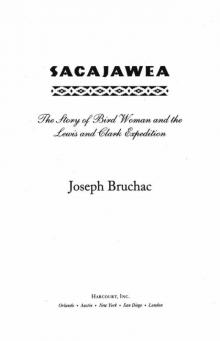 Sacajawea
Sacajawea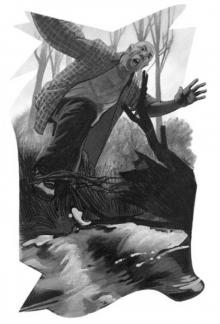 Night Wings
Night Wings March Toward the Thunder
March Toward the Thunder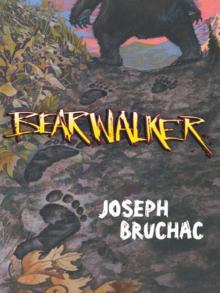 Bearwalker
Bearwalker Skeleton Man
Skeleton Man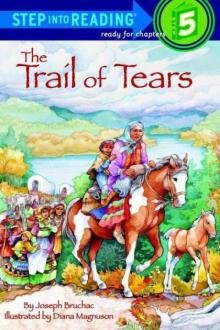 The Trail of Tears
The Trail of Tears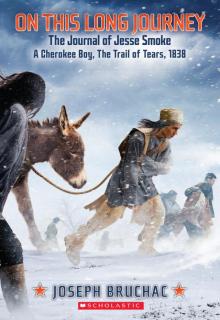 On This Long Journey
On This Long Journey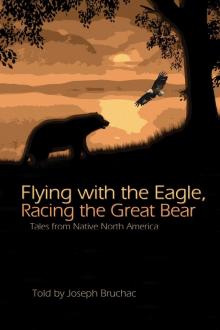 Flying with the Eagle, Racing the Great Bear
Flying with the Eagle, Racing the Great Bear